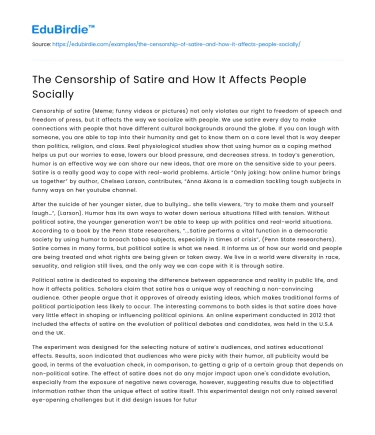Censorship of satire (Meme; funny videos or pictures) not only violates our right to freedom of speech and freedom of press, but it affects the way we socialize with people. We use satire every day to make connections with people that have different cultural backgrounds around the globe. If you can laugh with someone, you are able to tap into their humanity and get to know them on a core level that is way deeper than politics, religion, and class. Real physiological studies show that using humor as a coping method helps us put our worries to ease, lowers our blood pressure, and decreases stress. In today’s generation, humor is an effective way we can share our new ideas, that are more on the sensitive side to your peers. Satire is a really good way to cope with real-world problems. Article “Only joking: how online humor brings us together” by author, Chelsea Larson, contributes, “Anna Akana is a comedian tackling tough subjects in funny ways on her youtube channel.
After the suicide of her younger sister, due to bullying… she tells viewers, “try to make them and yourself laugh…”, (Larson). Humor has its own ways to water down serious situations filled with tension. Without political satire, the younger generation won’t be able to keep up with politics and real-world situations. According to a book by the Penn State researchers, “...Satire performs a vital function in a democratic society by using humor to broach taboo subjects, especially in times of crisis”, (Penn State researchers). Satire comes in many forms, but political satire is what we need. It informs us of how our world and people are being treated and what rights are being given or taken away. We live in a world were diversity in race, sexuality, and religion still lives, and the only way we can cope with it is through satire.
Save your time!
We can take care of your essay
- Proper editing and formatting
- Free revision, title page, and bibliography
- Flexible prices and money-back guarantee
Political satire is dedicated to exposing the difference between appearance and reality in public life, and how it affects politics. Scholars claim that satire has a unique way of reaching a non-convincing audience. Other people argue that it approves of already existing ideas, which makes traditional forms of political participation less likely to occur. The interesting commons to both sides is that satire does have very little effect in shaping or influencing political opinions. An online experiment conducted in 2012 that included the effects of satire on the evolution of political debates and candidates, was held in the U.S.A and the UK.
The experiment was designed for the selecting nature of satire’s audiences, and satires educational effects. Results, soon indicated that audiences who were picky with their humor, all publicity would be good, in terms of the evaluation check, in comparison, to getting a grip of a certain group that depends on non-political satire. The effect of satire does not do any major impact upon one's candidate evolution, especially from the exposure of negative news coverage, however, suggesting results due to objectified information rather than the unique effect of satire itself. This experimental design not only raised several eye-opening challenges but it did design issues for future audience opinion studies into satires reception. Our political system is viewed as a form of entertainment, and it has been for a long time.
Most people that claim to run the country for the benefit of their people, thus obviously pulling skepticism from all kinds of people, which is a good thing for the most part. The tendency to mock the people that run for our country is pretty healthy. Satire obviously had gotten a little more viscous and consistent over the years. There was even a time when political satirist tended to make fun of the process politics used to go through. Political folly is still as much with us except for the fact that political satire gains more popularity today than it ever has. The justification for political mockery goes back to Aristotle, “Laugh folly out of existence, Syllogistically” (Aristotle).






 Stuck on your essay?
Stuck on your essay?

